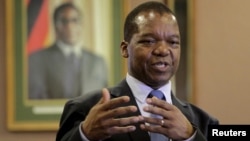Central bank governor John Mangudya says he is still engaging stakeholders before introducing bond notes in light of criticism that the Reserve Bank of Zimbabwe’s plans are unconstitutional.
“The dialogue that is taking place is going through social media, newspapers, and the press … It’s a healthy debate. We have noticed some of the comments, the advice (being) given. I think the legal opinions that were given initially were based on the wrong premises. They thought that we are introducing the bond notes for catering for shortages of cash. That’s not the case, that’s not the case. The bond notes are supporting or funding the export incentive or export incentive scheme that we need to introduce.
“We are still talking and the legal opinions I think they should keep on flowing. We are learning also from them … This is a democratic society and that is why it’s called an opinion and bond notes by the way, they are not currency. Bond notes are coupons, they are tokens. It’s a token of appreciation that are given to exporters.”
Asked if members of the public would be using bond notes, the governor of the central bank, accused over the years of printing worthless Zimbabwe dollars in an attempt to save the local economy, said they will be utilized in the same way as bond coins.
“They work like bond coins Blessing (Zulu). When you go to a shop today, you are given change in bond coins. The shop owner banks the bond coins together with the U.S dollar because they are at par. The same will be done with the bond notes because they are at par with the U.S (dollar) because they are on the same account which is the U.S dollar account where the money will be put into and you just withdraw it just the way you do with the U.S dollars.
“So, the funding mechanism is not through the company it’s the bank that now comes to us where they will just say Mangudya yesterday exported can we have the five percent to fund the position, the bank position … otherwise the bank will be short by that five percent. So, that’s how the banks will have the bond notes. We don’t just give them … So, it’s only after they export that the money is released into the economy. And you might want to know Blessing that after the tobacco producers requested that they wanted to use one account the U.S dollars, the gold producers have since unified everything.”
In terms of the loan derived from the African Export and Import Bank, he said, it’s all about the trust between Zimbabwe and the bank.
Reacting to legal queries on the expiry date of the bond notes, Mangudya said that was standard practice.
“We have heard what they (legal commentators) have said and we agree (with them) 100 percent.”
The central bank is expected to introduce the notes within the next two or so months.
The RBZ governor will be focusing on leaked Panama Papers on Friday showing that some business executives, including Zimbabweans, are stashing millions of dollars in offshore accounts in various countries.
There are many Zimbabwean names in the Panama Papers who were allegedly assisted by a Panamanian law firm, Mossack Fonseca, to set up offshore accounts in the British Virgin Islands.
The documents which belong to Mossack Fonseca were leaked by an anonymous source to a leading German newspaper, Suddeutsche Zeitung, which shared them with the International Consortium of Investigative Journalists (ICIJ).
ICIJ organized the global collaboration being participated by VOA Zimbabwe Service and other news organizations.
Some of the Zimbabweans named include top executives at Innscor Africa, Zinona Koudounaris and Michael Fowler; Zimplats chief executive officer, Alex Mhembere; Sable Chemicals boss, Jackson Murehwa; Harare businessman Victor Robinson Gapare and others.
By publishing this list, Studio 7 does not imply that the people named broke the law, or to suggest any wrongdoing on their part. Studio 7 published the names since the Panama Papers have become an issue of public interest.



















